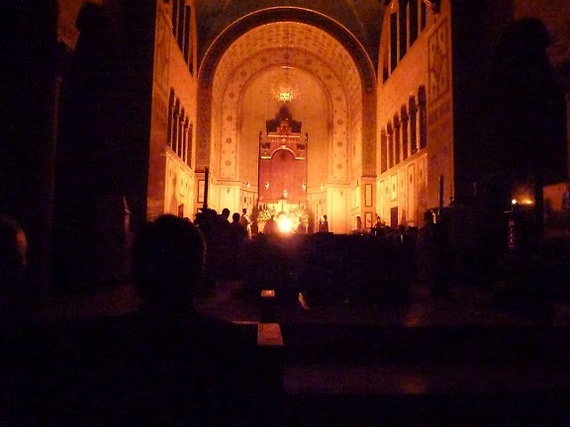Having previously advocated for traditional worship, I want to back up slightly and talk about why worship matters at all. Kazimierz Bem, writing on faithstreet earlier this year, ties the decline of church attendance in general to the lack of the centrality of worship in many churches (and its resultant mediocrity). Bem diagnoses the problem as the current overemphasis on social programs combined with the modern insistence on convenience uber alles. The result is that church becomes just one more consumer-driven arena which loses its customers when they don't get exactly what they personally desire from the experience. Bem writes:
When people sometimes tell me they don't get anything from worship, I am happy to answer, "That's great! Because it's not about you." Our culture needs a place -- we need a place in our lives -- to tell us that not everything is always about us, about our personal happiness, our convenience, our frantic timetables, or shrinking commitments.
Obviously, it's not that the goal is for people to not "get anything" from worship; the problem is, "getting something" seems to have insidiously become our criteria for what entails good worship, and we've lost our ability to even ask ourselves what it is that we are giving in worship. Worship is not meant to be entertainment, therapy, or a way for us to pat ourselves on the backs (although it can and sometimes effectively does, contain those elements). Worship is the adoration and praise we owe to our God, creator of all that is, the source of our life and abundance. In the ancient words of the sursum corda of the Eucharistic prayer, "It is right to give [God] thanks and praise."
The vast majority of people are juggling their commitment to God along with myriad other commitments, and often one hour a week is all the time they can give over to their spiritual lives. They deserve the best possible worship experience we can offer, whether it is a quiet, contemplative service or the grand drama of a high mass. That may be the only moment all week where John or Mary Q. Pew-warmer will have an experience of the transcendent God, present in their lives. That moment needs to be central to everything else we do as a church community or we are failing to nurture the relationships that God has initiated with them.
A big part of the problem is that over-correction (a recurring theme in church history) of the stodgy, dull worship services of the mid-20th century resulted in revival-style, Evangelical worship becoming the norm. What drew the crowds was rock bands, large venues, and bite-sized inspirational messages taken as much from pop psychology as from scripture. This re-tooling of worship style was highly successful in evangelizing from the 60s through the 80s, and that is what that style is meant for -- evangelizing. But new generations thirsted for worship that was more than conversion-oriented, that empowered Christians with tools of discipleship for a mature, spiritual life, and thus began the emergent movement, restoring ancient practices through things like traditional music, candles, icons and more frequent communion. This movement is often characterized as a rejection of Baby Boomer-style by GenXers and Millennials, but the issues are much deeper than what's on the surface. When church looks exactly like everything else in the world -- when the music sounds exactly the same as what you hear on the radio and commercials, when you are shown slick videos just like you find on the web, when you are in a drab, concrete structure not much different than the architecture of your local chain store, when the ministers dress like tourists in Hawaiian shirts, then how is church different from anything else we do? And if it's no different, then what's the point? Why should I give up an hour or so of my Sunday when I'm working 47 hours a week (what the average American works) to see and hear exactly the same stuff I can see and hear anywhere else?
For many, the answer has been, "I shouldn't!" But for others who wish to remain involved in church, the answer has been twofold: service and community. Church offers you a chance to be a part of a community and also to give something back. Those are compelling and critical elements of any congregation's life. But again, they are things that can be found elsewhere, in service organizations and various social and recreational groups. Worship is the one thing that churches can offer that looks nothing like everything else in the world, that gives us a glimpse at the ineffable. Losing our focus on that will not only continue to result in declining numbers, it will eat away at the vibrancy of our own spiritual lives. Worship should be central to the life of every congregation, large and small, both as an offering to God and to our community, and to the random stranger who may walk through the doors, hungry for an encounter with the God of the universe. We owe it to them to at least attempt to provide that.

